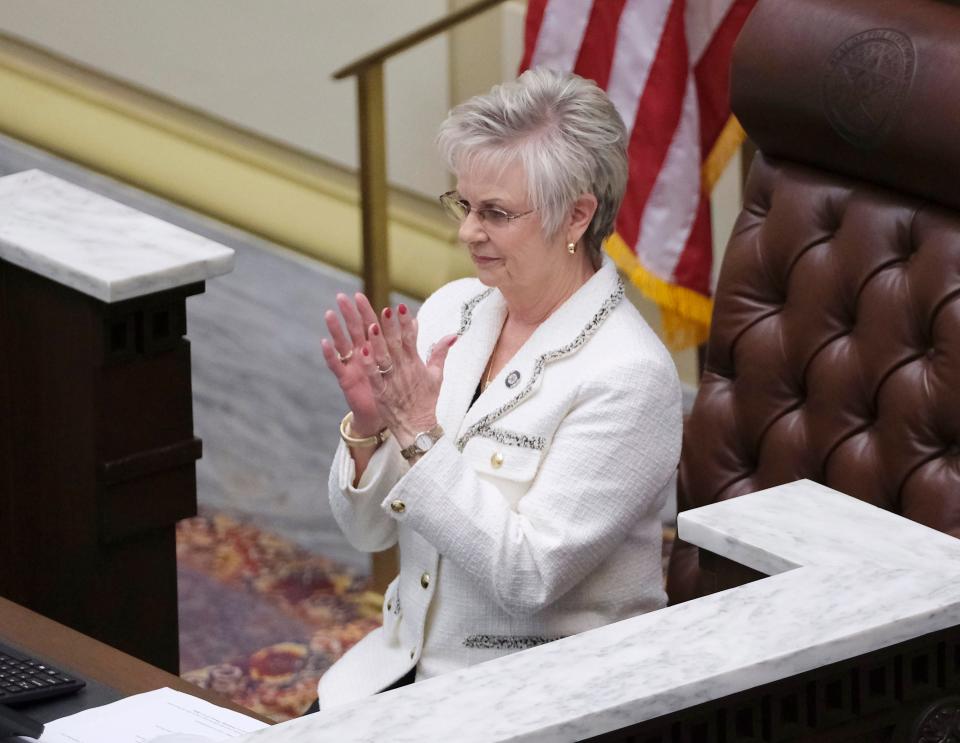Oklahoma Senate committee advance two bills listing exceptions to state's abortion laws
- Oops!Something went wrong.Please try again later.
An Oklahoma Senate committee advanced two bills Thursday that would clarify what is (and isn't) a legal abortion in Oklahoma.
One was introduced to clarify the Legislature's intent when it comes to medical procedures that terminate pregnancy. The other stipulates that Oklahoma's abortion laws shouldn't limit access to birth control drugs.
"We're trying to establish uniformity and clarity because some of these statutes have been passed over many years, from 1910 all the way to 2022," Sen. Julie Daniels, R-Bartlesville, said during a meeting of the Senate Health and Human Services Committee.
After Roe v. Wade was overturned last year, abortion became illegal in Oklahoma. State lawmakers had prepared for that day by adopting what's known as a "trigger," which criminalized abortion if the U.S. Supreme Court overturned Roe.

Over the years leading up to the court's ruling, Oklahoma politicians enacted a number of other laws to limit or outright ban abortion, leading to a patchwork of regulation that some doctors said is confusing and sometimes contradictory.
In August, a law went into effect that carried harsher criminal penalties for doctors or others who perform or help perform abortions. Another bill signed last year effectively implemented a near-total abortion ban by allowing private citizens to sue anyone who "aids or abets" a woman seeking an abortion.
Daniels said she filed Senate Bill 834 to make Oklahoma's "pro-life" laws more organized and more consistent.
More:Why programs like paid family leave might be getting more Oklahoma Republican support
Abortion ban exceptions
According to Daniels' bill, these medical treatments and procedures would not be considered an illegal abortion:
Terminating a pregnancy that is the result of a rape or sexual assault as long as the crime was reported to law enforcement.
Terminating the pregnancy of a minor that is the result of incest as long as the crime was reported to law enforcement.
The prescription and use of contraception, but only if it is administered before medical tests confirm pregnancy.
In vitro fertilization and fertility treatment.
Termination of a pregnancy if the mother faces death or "serious risk of substantial and irreversible physical impairment of a major bodily function."
Procedures after a miscarriage.
Removal of an ectopic pregnancy.
5 takeaways: Gov. Kevin Stitt pushes tax cuts, school choice in State of the State
During presentation of the bill, Democratic Sen. Carri Hicks, of Oklahoma City, focused on the requirement that rape victims must report the crime before receiving medical care to terminate a pregnancy.
"Are we saying that we don't trust women who are accessing medical treatment because they've been raped or a victim of incest?" Hicks asked.
Daniels replied that research shows that fewer than 3% of abortions are the result of rape or to save the mother's life.
"We're not talking about a large number, and in fact (it) probably would be almost never used," Daniels said.
Senate Bill 368, which also advanced from committee, further attempts to clarify that Oklahoma's abortion laws should not be construed to prohibit, restrict, limit or otherwise affect the use of contraceptive drugs or surgeries. Its author is state Sen. Jessica Garvin, R-Duncan.
Both bills are now eligible for a hearing on the Senate floor.
More:After banning abortion in Oklahoma, Republican lawmakers come back with exceptions
This article originally appeared on Oklahoman: Bills move forward listing exceptions to Oklahoma's abortion laws

